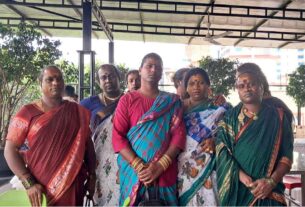Situation dire for traffic cops as nine out of sixteen air quality monitoring stations across the city have unsafe recorded PM 2.5 particulate matter.
By Arghyadeep Dutta
The on-duty traffic police personnel are refusing to use anti-pollution masks provided by the Bengaluru Traffic Police Department because of the allegedly inferior quality of the mask. These traffic police personnel have to stand in the open for long hours and are thus exposed to pollutants.
The 2018 report of ‘Air Pollution from Transportation Sources in Bangalore’ by Mahesh Kashyap, shows nine out of 16 air quality monitoring stations across Bengaluru have recorded particulate matter (PM 2.5), which is more than the National Ambient Air Quality Standards. With the increase in the number of vehicles in the city, the pollution has risen significantly.
Bengaluru Traffic Police Department handed 3000 on-duty policemen an anti-pollution mask each on May 30, 2019, with a note “Wearing them is a must.”
However, The Softcopy observed that most of the on-duty traffic police personnel either do not use them or they use one of their own.
“These masks that the department gave to us are terrible. I bought a mask from an online retail store which has an inbuilt air filter to it,” said traffic police personnel, at Majestic.
Anti-pollution masks are used to protect the wearer from pollutants present in the air. The mask can be a single-use mask or a reusable mask. An anti-pollution mask should be capable enough to filter PM 2.5 airborne with up to 99 to 99.97 percent efficiency.
A 2020 study on respiratory morbidities and pulmonary functions among traffic policemen in Bengaluru, by Department of Community Medicine, Kempegowda Institute of Medical Sciences revealed that among 217 traffic policemen, who were included in the study, 101 traffic police personnel (46.5%) used personal protective measures. Allergic rhinitis was reported by 38 (17.5%) individuals, and 28 (12.9%) individuals had chest symptoms (cough and breathing difficulty). Among them, 44 individuals (20.3%) experienced an exacerbation of these symptoms at the workplace. The mean duration of these policemen working in the traffic department was 6 years.
Dr. Md Majeed Pasha, a pulmonologist said, “The cops who are standing at the major junctions of the city for a significant time can experience lifelong serious health problems due to breathing in various specks of dust, pollutants, fumes or smog, which could lead them to lung cancer.”
In 2017, the Mangaluru-based Anti-Pollution Drive (APD) Foundation, and Eureka Forbes, conducted a pulmonary function test on 235 Bengaluru traffic police officers. The result revealed that 31 percent of them had reduced lung function and 20 percent had some form of respiratory problems. The medical data shows that the symptoms were more pronounced among traffic policemen compared to residents in Bengaluru.
“During rush hours, we are exposed to smog, dust, and environmental pollution every day, and it affects us. Most of my colleagues have some chronic breathing problems and some of them have asthma too,” said an officer at Mahatma Gandhi Road.
Dr. B.R. Ravikanthe Gowda, Additional Commissioner of Police (Traffic) said, “We are looking into the issue deeply. We provide use and throw anti-pollution masks regularly to the policemen and we will counsel those who are not using it.”




